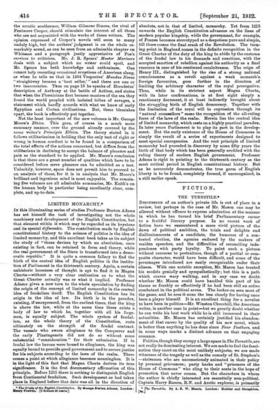LIMITED MONARCHY.*
IN this illuminating series of studies Professor Burton Adams has set himself the task of investigating not the whole machine'', and development of the English Constitution, but that element within it which may be regarded as its keystone and its special differentia. The contribution made by English constitutional history to the science of politics is the idea of limited monarchy, and this excellent book takes as its subject the study of "those devices by which an absolutism, once existing in fact, can be retained in form and theory, while the real government of the State is transformed into a demo- cratic republic." It is quite a common fallacy to find the birth of the central idea of English politics in the institu- tion of Parliament in the thirteenth century. Again, a certain nnhistorie looseness of thought is apt to find it in Magna Charta—without a very clear realization as to what the Great Charter actually was or what it implied. Professor Adams gives a new turn to the whole speculation by finding the origin of the concept of limited monarchy in the central idea of feudalism itself. The English Constitution has its origin in the idea of law. Its birth is in the paradox, existing, if unexpressed, from the earliest times, that the king is above the law, while at the same time there exists a body of law to which be, together with all his liege- men, is equally subject. The whole system of feudal. ism, as the whole theory of the Constitution, rests ultimately on the strength of the feudal contract. The vassals who swore allegiance to the Conqueror and the early Plantagenets did not do so without some substantial " consideration " for their submission. If in feudal law the barons were bound to allegiance, the king was equally bound to provide good government and to secure justice for his subjects according to the laws of the realm. There comes a point at which allegiance becomes meaningless. It is in the light of this fact that Magna Charta derives its true significance. It is the first documentary affirmation of this principle. Before 1215 there is nothing to distinguish English from Continental feudalism. Such development as had taken place in England before that date was all in the direction of • The Origisuf the BisqUalv Cosureitution. By goons BlIrt.931 Adams. London : X/II*7 Frawde.. E2 dollars 25 seats.]
absolute, not in that of limited, monarchy. Yet from 1215 onwards the English Constitution advances on the lines of modern popular kingship, while the government, for example, of France becomes stereotyped as a despotism pure and simple, till there comes the final crash of the Revolution. The turn- ing point in England comes in the definite recognition in the Great Charter of the duty of the king to abide by the customs of the feudal law in his demands and exactions, with the accepted sanction of rebellion against his authority as a final resource in case of his continued recalcitrance. The reign of Henry III., distinguished by the rise of a strong national consciousness as a revolt against a weak monarch's foreign favourites, goes further in the direction of limiting the arbitrary character of the royal prerogative. Thus, while in its strictest aspect Magna Charta, with its later confirmations, is at first sight simply a reactionary document, it at least indirectly brought about the struggling birth of English democracy. Together with the limitation of the royal will to expression through its "natural counsellors" came the recognition of the all-ruling force of the laws of the realm. Herein lies the central idea of limited monarchy, which rests on a highly practical paradox. In later years Parliament is to play its part in the develop- ment. But the early existence of the House of Commons is simply the result of a series of experiments designed. to. meet special emergencies. And the root principle of limited monarchy had preceded in discovery by some fifty years the birth of that body which has been generally credited with the ruling theory of modern English government. Professor Adams is right in pointing to the thirteenth century as the most critical period in English constitutional history. But as he accurately demonstrates, the true germ of English liberty is to be found, completely formed, if unrecognized, in a still earlier epoch.










































 Previous page
Previous page